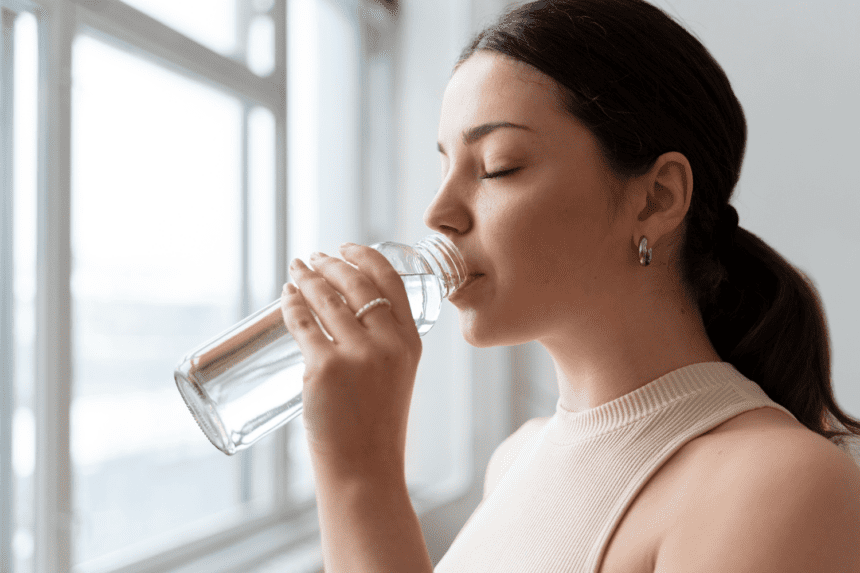One of the most crucial parts of the diet is proper hydration; consuming enough liquids to maintain the fluid levels in the body allows all physiological systems to perform normally.
Importance of Hydration
Drinking plenty of water every day is essential for many reasons, including body temperature management, joint lubrication, infection prevention, nutrient delivery, and organ function preservation. It also enhances sleep quality, cognitive function, and mood. Doctors prescribe how much water should be consumed each day to keep hydrated, which we shall cover more in this blog.
The benefits of staying hydrated
1. Improved brain function
Mild dehydration can affect memory, mood, focus, and response speed. Including water in your daily diet can boost cognition, regulate emotions, and reduce anxiety, especially for older people who are more susceptible to dehydration and poor cognitive performance.
2. Hydration and digestion
Cognitive speed, mood, memory, and focus can all be affected by mild dehydration. Increasing regular water consumption can help with anxiety reduction, emotional regulation, and cognitive function—especially for older people who are more likely to experience dehydration and cognitive decline.
3. Increased stamina
Dehydration can impair the transport of oxygen to the brain and delay circulation. If you don’t drink enough water, your heart may have to work harder to transport oxygen throughout your body. You may feel weary, sluggish, and less focused as a result of expending so much energy. Increased water consumption may help you prevent dehydration and have more endurance to get through the day.
4. Hydration for weight loss
Drinking water increases metabolism and gives you a feeling of fullness in between meals. Increased water consumption before meals has been shown in studies to lower body composition, body weight, and body mass index.
Adults with a 1% water intake can reduce weight by 5% by drinking more water daily, replacing calorie drinks with water, and drinking water before meals.
5. Hydration in hot weather
Dehydration lowers heat tolerance by increasing heat storage. Drinking water to stay hydrated encourages sweating, which cools the body. Since it aids in the prevention of heat stroke and other heat-related illnesses, this built-in cooling system is essential.
6. Preventing kidney stones
By drinking lots of water, you can lessen the discomfort caused by kidney stones, which are mineral crystals in the urinary system. This lowers mineral concentrations, clears the bladder of dangerous germs, and guards against urinary tract infections (UTIs).
Signs of dehydration or Dehydration symptoms
1. Feeling thirsty
2. Dark yellow, strong-smelling urine
3. pee less frequently than normal
4. feel dizzy or lightheaded
5. Feeling exhausted
6. Dry mouth, lips, and tongue
7. Sunken eyes
Hydration Tips
1. Drink as soon as you feel thirsty, if not earlier. Drink a large glass of water before, during, and after every meal.
2. Make water the mainstay of your hydration plan, or substitute it with low-calorie drinks like flavored water, sparkling water, or plain coffee or tea.
3. Keep a big, reusable water bottle with you at all times, and fill it up with fresh, clean water as required.
4. To be properly hydrated, people should drink more water while they are exercising, it’s hot outside, they are throwing up, or they have diarrhea.
How Much Water to Drink
1. It is advised that males consume 13 cups, or around 3 liters, of daily water consumption.
2. It’s advised that women consume nine cups, or a little more than two liters, of water per day.
3. Ten glasses of water should be consumed daily by pregnant women and twelve cups by nursing mothers.
4. 6 to 8 glasses of water should be consumed daily to provide hydration for children and teenagers. Again, it all relies on factors like age, weight, and degree of exercise.
The best drinks for hydration
For starters, over 85% of the fluids we consume come from liquids like water, milk, fruit juice, tea, coffee, and soft drinks. Nutrients, including carbohydrates, fats, vitamins, and minerals, are also present in some beverages. But the best drinks for hydration are:
1. Fruit juice is a healthy choice as it contains sugars, vitamins, and minerals. It also helps with fluid intake. However, only one glass of fruit juice counts daily, and the suggested size is 150 ml.
2. Water is essential for human health since it facilitates several biological activities such as nutrition delivery, waste disposal, joint protection, and body temperature control.
Conclusion
Adequate hydration is crucial for overall health, promoting body activities like temperature control, joint lubrication, nutrition transfer, cognitive function, mood, stamina, weight control, and digestion. It’s especially important in hot weather and prevents kidney stones.
Recognizing dehydration symptoms and following hydration measures, such as drinking water daily and increasing consumption for hydration and exercise activity or sickness, will decrease dehydration.
Following the suggested daily water consumption requirements will help you maintain excellent health and avert dehydration-related issues as well.


Leave a Reply